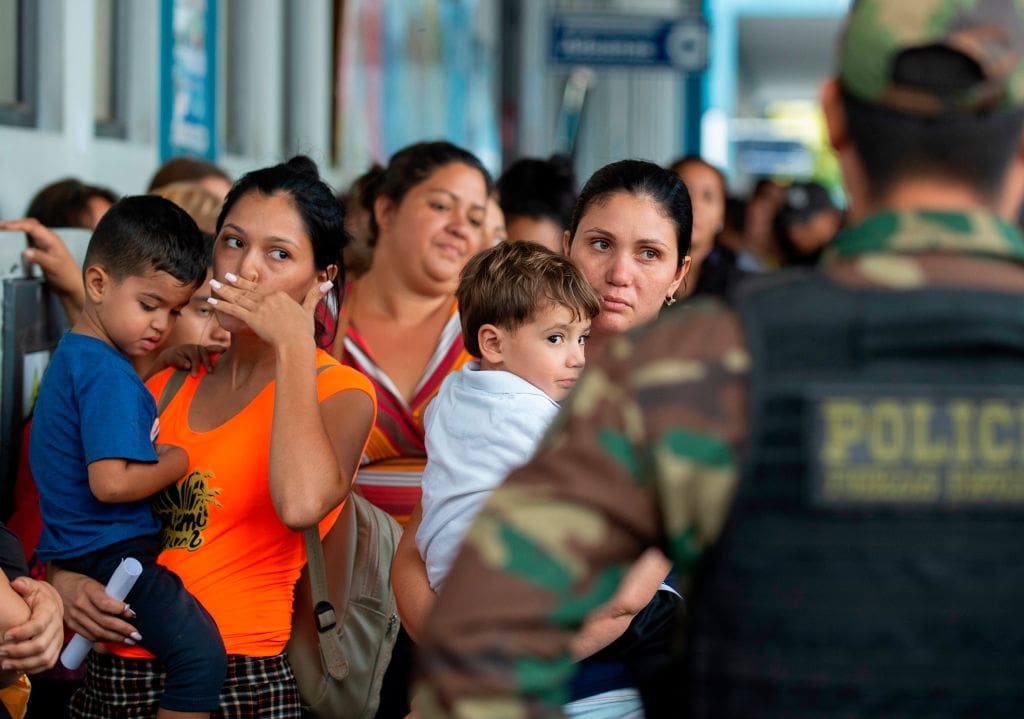“Protection from gender-based violence should be a priority for all states in the Americas, as should the protection of those fleeing massive human rights violations in their countries of origin. Instead, Venezuelan refugee women are facing a double and brutal lack of protection, as our report on the situation in Colombia and Peru reveals,” said Erika Guevara-Rosas, Americas director at Amnesty International.
More than six million people have fled Venezuela in recent years because of massive human rights violations. Colombia and Peru have received the largest numbers of Venezuelans, together hosting more than 50% of all those who have fled Venezuela (1.84 million and 1.29 million respectively). Amnesty International believes that Venezuelans are in need of international protection and have the right to request that their refugee status be recognized.
This new report highlights how Venezuelan refugee women, who represent 50% and 58% of the Venezuelan population in Colombia and Peru respectively, face violence and discrimination in all aspects of their lives because of their gender and nationality. In public spaces, they face attacks both along the migration routes and in the places where they settle. In the family, they face economic, patrimonial, physical and sexual violence, predominantly from partners or former partners. And in the work environment, they experience various forms of violence and labour exploitation, including being co-opted for work for the purpose of sexual exploitation.
Faced with this pervasive violence, Amnesty International has concluded that the Colombian and Peruvian states are manifestly not complying with their obligation to guarantee a life free from violence and discrimination to Venezuelan refugee women, or to guarantee access to justice for survivors of gender-based violence.
“Many Venezuelan women who are victims of male violence and whose lives are at risk prefer not to report for fear of being expelled from the country owing to their documentation status. The violence and risks they face are exacerbated by the absence of specialized protocols to support and protect them. Regularizing their migration status is a fundamental step so that they can report the violence they experience,” said Marina Navarro, executive director of Amnesty International Peru.
Extensive research was carried out during the first half of 2022, virtually and in the field, including visits to Lima and Tumbes in Peru, and Bogotá, Cúcuta and Soacha in Colombia. For this report, Amnesty International interviewed 63 Venezuelan refugee women and conducted 45 research interviews with civil society organizations, including Venezuelan women’s organizations; international agencies, such as the United Nations High Commissioner for Refugees (UNHCR) and UN Women; and state institutions.
According to official figures, gender-based violence against Venezuelan refugee women in Colombia increased by 71% between 2018 and 2020, and in Peru by 31% between 2019 and 2021. Xenophobia, migration status, myths about foreign nationals causing security issues, and prejudices related to women’s perceived sexuality, coupled with socially predetermined gender roles, increase the risks faced by Venezuelan refugee women.
The report reveals multiple areas where the state has failed to ensure protection in both Colombia and Peru. Firstly, Venezuelan women do not have effective access to international protection and migration regularization processes, which constitutes a primary and significant obstacle to ensuring protection of their other rights.
Secondly, the Colombian and Peruvian states do not guarantee the right of Venezuelan women to access justice and health services without discrimination. Among many shortcomings in state responses in both countries, the research exposes the lack of awareness on the part of officials responsible for addressing the needs of survivors of gender-based violence about the rights, care pathways and protection measures that Venezuelan women should enjoy, as well as stereotypes related to the nationality and gender of these women, or their gender identity. It also exposes the lack of availability of and access to temporary shelters and the lack of adequate statistical information.
Amnesty International calls on the Colombian and Peruvian authorities to take immediate measures to ensure that Venezuelan women can enjoy a life free from violence and without discrimination based on gender, nationality, migration status or any other grounds. In particular, the Colombian and Peruvian governments should combat stigmatization of and discrimination against Venezuelan women, ensure their access to international protection, ensure effective access to justice, improve measures to prevent and address gender-based violence, and ensure comprehensive healthcare for women survivors of gender-based violence.
Read more:
Unprotected: Gender-based violence against Venezuelan refugee women in Colombia and Peru (research, July 12, 2022) https://www.amnesty.org/es/documents/amr01/5675/2022/es/
Between invisibility and discrimination: Venezuelan LGBTIQ+ refugees in Colombia and Peru (research, June 20, 2022) https://www.amnesty.org/en/latest/news/2022/06/venezuelan-lgbtiq-refugees-colombia-peru/
Peru is failing in its care of Venezuelan women who survive gender-based violence (research, November 25, 2021) https://www.amnesty.org/en/latest/news/2021/11/peru-failing-care-venezuelan-women-survive-gender-based-violence/
Peru: In search of safety: Peru turns its back on people fleeing Venezuela research, February 4, 2020) https://www.amnesty.org/en/documents/amr46/1675/2020/en/
Contact: Gabby Arias, [email protected]

